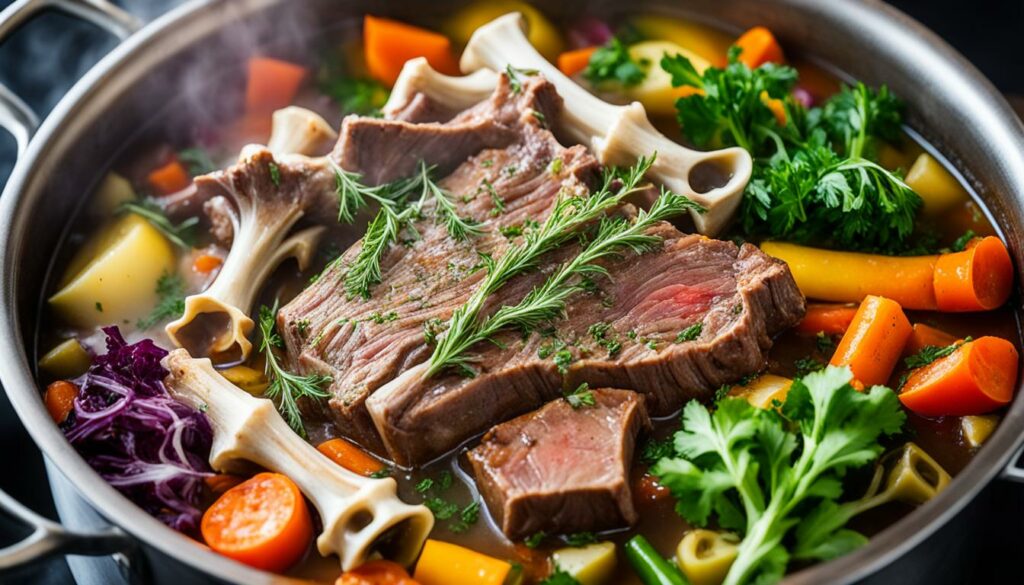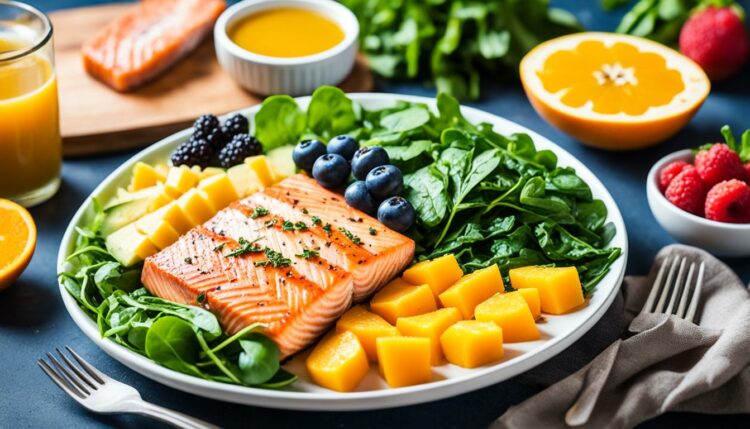Did you know that collagen is a vital protein that plays a crucial role in maintaining the health and structure of our skin, bones, muscles, and tendons?
As we age, our body’s collagen production decreases, leading to visible signs of aging such as wrinkles and thinning skin. However, incorporating collagen-rich foods into your diet can help boost your collagen intake and enhance the health of your skin and hair.
Are you curious to learn about the best collagen-rich foods that you can easily include in your eating pattern? Let’s dive into the top sources of collagen and discover how they can contribute to the health and vitality of your skin and hair.
Key Takeaways:
- Collagen is a vital protein that helps maintain the health of our skin, hair, and other structures in our body.
- As we age, our body’s collagen production decreases, leading to visible signs of aging.
- Incorporating collagen-rich foods into your diet can help boost collagen intake and enhance the health of your skin and hair.
- Some of the top collagen-rich foods include beef bone broth, chicken, porcine collagen from bone broth, and fish collagen from whole fish and fish skin.
- Adding these collagen-rich foods to your eating pattern can support collagen production and promote healthier skin and hair.
Bovine Collagen: Beef Bone Broth as a Top Source
Bovine collagen, derived from cattle, is considered one of the top sources of collagen. Collagen, a crucial protein for skin, hair, and nails, plays a vital role in their health and appearance.
When our body’s collagen production decreases with age, incorporating collagen-rich sources into our diet becomes essential for maintaining youthful-looking skin and strong, healthy hair and nails.
Beef bone broth, in particular, is an excellent source of collagen type I. This type of collagen is known for its effective support in achieving healthy skin, hair, and nails. It helps in improving skin elasticity, reducing the appearance of fine lines and wrinkles, and strengthening hair strands and nails.
Including beef bone broth in your diet provides you with a natural source of bovine collagen. It is a nourishing option to enhance the vitality and appearance of your skin, hair, and nails.

Collagen Type I: The Key to Skin, Hair, and Nail Health
Collagen type I is an essential component of our skin’s structure, making up a significant portion of its dermis layer. As we age, the production of collagen type I decreases, leading to visible signs of aging like wrinkles, sagging skin, and brittleness in hair and nails.
Incorporating collagen-rich sources, like beef bone broth, into your diet can aid in replenishing collagen levels and promoting optimal skin, hair, and nail health. It helps to improve skin firmness, enhance hair volume and thickness, and strengthen nails.
Did You Know?
Collagen type I comprises approximately 90% of the collagen in our bodies, making it integral for maintaining healthy skin, hair, and nails.
Benefits of Bovine Collagen for Skin, Hair, and Nails
Consuming bovine collagen, especially through collagen-rich sources like beef bone broth, offers several benefits for skin, hair, and nails:
- Improved skin elasticity
- Reduced appearance of fine lines and wrinkles
- Enhanced hair strength and thickness
- Strengthened nails, reducing brittleness
These benefits highlight the significance of bovine collagen in promoting overall skin, hair, and nail health.
| Collagen-Rich Sources | Type of Collagen |
|---|---|
| Beef bone broth | Type I |
| Chicken collagen | Type II |
| Porcine collagen | Type III |
| Fish collagen | Type V |
Chicken Collagen: Skin-On Chicken for Fine Lines and Wrinkles
Chicken is a widely consumed protein-rich food that can also provide collagen benefits.
Collagen from chicken cartilage has shown promising results in improving fine lines, wrinkles, crow’s feet, and skin elasticity, particularly in middle-aged women. Including skin-on chicken in your diet can be an excellent way to increase your collagen intake and support better skin health.
When choosing chicken cuts, opt for ones that have the skin intact, as it is a rich source of collagen. You can enjoy roasted chicken thighs or chicken breast with the skin-on to maximize the collagen content.
If you prefer ground chicken, selecting ground chicken that includes the skin can also be beneficial. Incorporating collagen-rich ground chicken into your meals, such as burgers or meatballs, can provide an additional boost of collagen for your skin.
To give you a better idea of the collagen content in skin-on chicken, take a look at the following comparison:
| Chicken Cut | Collagen Content (per 100g) |
|---|---|
| Skinless Chicken Breast | Low collagen content |
| Skin-On Chicken Thigh | Higher collagen content |
As you can see, opting for skin-on chicken, like chicken thighs, can provide you with a collagen-rich poultry option that may contribute to better skin health.
Note: Collagen is usually found in the connective tissues, joints, and cartilage of animals, so skin-on cuts tend to have a higher collagen content compared to skinless cuts.

Porcine Collagen: Bone Broth for Skin and Wound Repair
Porcine collagen, derived from pigs, closely resembles human collagen and is widely used in medical settings for skin, wound, and tendon repair. This natural collagen source offers numerous benefits for promoting healthy skin and supporting the healing process.
One of the most popular ways to incorporate porcine collagen into your diet is through bone broth. Bone broth made from porcine collagen is abundant in this vital protein, making it a collagen-rich and nourishing option for skin and wound repair.
When consumed regularly, porcine collagen-rich bone broth may contribute to improved skin health, enhancing the repair and reinforcement of damaged skin, wounds, and tendons. It provides essential nutrients for collagen production and can help maintain the structural integrity of the skin.
Evidence suggests that collagen-rich porcine products, such as bone broth, can help support the natural healing process of wounds, including surgical incisions, by promoting tissue regeneration and reducing inflammation. This can result in improved wound healing outcomes and reduced scarring.
Moreover, porcine collagen is a valuable resource for tendon repair. Tendons, which connect muscles to bones, play a crucial role in body movement and stability.
The supplementation of porcine collagen through bone broth or other collagen-rich porcine products may aid in tendon repair and recovery, promoting joint health and flexibility.
Adding porcine collagen-rich bone broth to your diet is a simple and nutritious way to support the health and healing of your skin, wounds, and tendons. By providing essential collagen-building blocks, porcine collagen can contribute to the maintenance of strong connective tissues and overall well-being.
With its abundant collagen content and potential benefits for skin and wound repair, porcine collagen offers a valuable addition to any collagen-focused diet.
Fish Collagen: Whole Fish and Fish Skin for Collagen Boost
Fish collagen is a valuable source of this essential protein. Collagen is concentrated in the bones, skin, and scales of fish, making it a collagen-rich option for enhancing the health of your skin and hair.
When incorporating fish collagen into your diet, consider consuming the whole fish or including the skin to maximize your collagen intake. By doing so, you can benefit from a collagen boost that supports collagen production and promotes the health of your skin and hair.
Another way to increase your collagen consumption is by cooking fish fillets with the skin and consuming the skin along with the flesh. This approach can further contribute to the collagen-rich diet you desire, helping to nourish your skin and promote overall health.
One collagen-rich fish variety to focus on is sardines. Sardines are known for their high collagen content, making them an excellent choice for obtaining fish collagen. By including sardines in your meals and enjoying the collagen found in their bones and skin, you can further support the health and vitality of your skin and hair.
FAQ
Are there any collagen-rich foods that can improve the health of my skin and hair?
Yes, there are several collagen-rich foods that can enhance the health of your skin and hair. Including these foods in your diet can help boost your collagen intake and promote better skin and hair health.
What are some collagen-rich sources for a collagen-rich diet?
Some of the best sources of collagen include beef bone broth, chicken (especially including the skin), porcine collagen found in bone broth, and fish collagen from the bones, skin, and scales of fish.
How does bovine collagen, specifically beef bone broth, benefit the skin and hair?
Bovine collagen, found in beef bone broth, is considered a top source of collagen. Its collagen type I is essential for the health of our skin, hair, and nails. Adding beef bone broth to your diet can provide natural collagen to support the appearance and vitality of your skin and hair.
Does chicken collagen have any specific benefits for fine lines and wrinkles?
Yes, chicken collagen, especially collagen from chicken cartilage, has been shown to improve fine lines, wrinkles, crow’s feet, and skin elasticity in middle-aged women. Including skin-on chicken in your diet or consuming collagen-rich ground chicken can provide you with collagen to support better skin health.
Can porcine collagen, commonly found in bone broth, help in skin, wound, and tendon repair?
Yes, porcine collagen, which closely resembles human collagen, is often used in medical settings for skin, wound, and tendon repair. Consuming collagen-rich bone broth made from porcine collagen can promote healthy skin and support the repair and reinforcement of skin, wounds, and tendons.
How can fish collagen be incorporated into the diet to enhance collagen production and skin and hair health?
Fish collagen is concentrated in the bones, skin, and scales of fish. Including the whole fish or consuming the skin when consuming collagen-rich fish, such as sardines, can provide a collagen boost.
Additionally, cooking fish fillets with the skin and consuming the skin can also contribute to increased collagen intake and support collagen production for healthier skin and hair.




